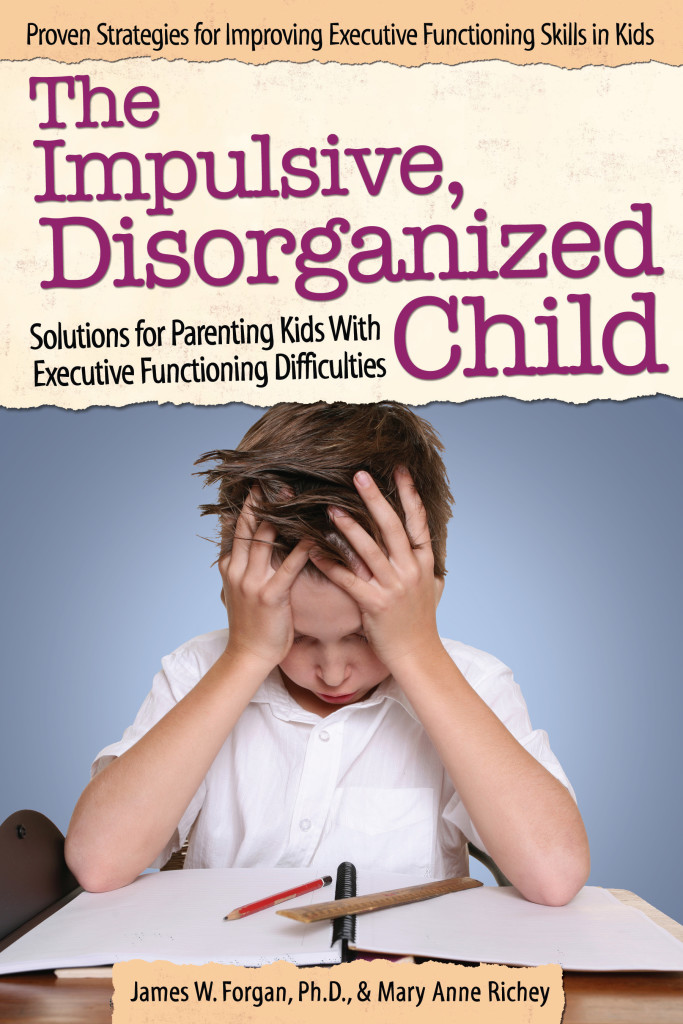
As a reader of The Impulsive, Disorganized Child: Solutions for Parenting Kids with Executive Functioning Difficulties I am pleased to share the following guest post with you, written by one of it’s authors, Dr. Jim Forgan. As a parent of an extremely impulsive disorganized child, I’m especially fond of the advice offered in the book as well as in this article on biblitherapy. Thanks for reading!

Using books to help children has several advantages. Adults can use books to help children understand and recognize they are not alone. Children’s books can also be used to teach children how to become problem solvers. Third, books can be used to help children find solutions to their challenges.
In our book, The Impulsive, Disorganized Child: Solutions for Parenting Kids with Executive Functioning Difficulties, we have chapters related to the different areas of executive functioning. In each chapter we provide a list of children’s books that parents can use to help teach their child. We also provide a framework that parents can follow when using the book to have a discussion with their child. Parents can have an open and honest conversation that won’t scare or discourage their child.
We teach parents this framework because it helps teach children skills they need to become self-sufficient and independent in an age-appropriate manner. For example, your third grader with executive functioning difficulty may have trouble picking out his or her clothes in the morning. So to reduce stress you can provide instruction so that your child selects their clothes the night before. You could even have your child try on their clothes to make sure they don’t itch, scratch, or feel funny. Although providing this type of support and teaching your child is more time-consuming than just doing it yourself, in the end it gives your child an internal feeling of success and independence. These are two important skills that your child will need throughout his or her school years—and beyond.
In the book, Terrific Teddy’s Excessive Energy, parents can help kids understand why their bodies must frequently move, why it’s hard to concentrate, and why they may get in trouble for behavior they often can’t help. Additionally, kids learn why parents are going to help by making family changes and doing things differently. For example, in the book Teddy learns that he is going to start to eat healthier, exercise more, and have more proactive reminders about behaving before he goes into a situation. Children relate to Teddy and can identify with challenges similar to their own.
You can teach your child impulse control through books such as Sitting Still Like a Frog: Mindfulness Exercises for Kids. This book provides specific breathing techniques that help children learn to calm themselves. With practice, your child can learn to recognize when he is feeling fidgety or restless and apply purposeful breathing to self-calm. Imagine the feeling your child will have when he or she takes control of their impulses instead of the other way around.
By reading children’s books you’ll be teaching your child valuable life skills while simultaneously having quality time. You’ll find more practical ideas like these in The Impulsive, Disorganized Child.
Dr. Jim Forgan
Author Bios:
Jim Forgan, Ph.D., is an associate professor and Licensed School Psychologist. He teaches others how to teach and assess children with ADHD and other types of learning disabilities at Florida Atlantic University in Jupiter, FL. In private practice, he works with families of children with ADHD and other learning differences. Jim consults with public and private schools doing workshops on ADHD, dyslexia, problem solving, and accommodations for learning disabilities. He is also the parent of a young son with ADHD.
Mary Anne Richey, M.Ed., a Licensed School Psychologist, works for the school district of Palm Beach County and has a private practice. She also has experience as a middle school teacher, administrator, high school guidance counselor, and adjunct college instructor. Mary Anne has assisted many students with ADHD and their families over the years. She is the parent of an adult son with ADHD.
Mary Anne and Jim are also the authors of Raising Boys With ADHD: Secrets for Parenting Healthy, Happy Sons and Raising Girls With ADHD: Secrets for Parenting Healthy, Happy Daughters.



